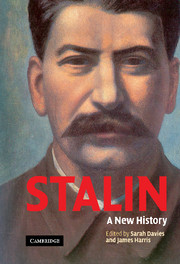Book contents
- Frontmatter
- Contents
- Notes on contributors
- Preface
- A note on transliteration
- Glossary
- 1 Joseph Stalin: power and ideas
- 2 Stalin as Georgian: the formative years
- 3 Stalin as Commissar for Nationality Affairs, 1918–1922
- 4 Stalin as General Secretary: the appointments process and the nature of Stalin's power
- 5 Stalin as Prime Minister: power and the Politburo
- 6 Stalin as dictator: the personalisation of power
- 7 Stalin as economic policy-maker: Soviet agriculture, 1931–1936
- 8 Stalin as foreign policy-maker: avoiding war, 1927–1953
- 9 Stalin as Marxist: the Western roots of Stalin's russification of Marxism
- 10 Stalin as Bolshevik romantic: ideology and mobilisation, 1917–1939
- 11 Stalin as patron of cinema: creating Soviet mass culture, 1932–1936
- 12 Stalin as producer: the Moscow show trials and the construction of mortal threats
- 13 Stalin as symbol: a case study of the personality cult and its construction
- 14 Stalin as the coryphaeus of science: ideology and knowledge in the post-war years
- Index
8 - Stalin as foreign policy-maker: avoiding war, 1927–1953
Published online by Cambridge University Press: 24 November 2009
- Frontmatter
- Contents
- Notes on contributors
- Preface
- A note on transliteration
- Glossary
- 1 Joseph Stalin: power and ideas
- 2 Stalin as Georgian: the formative years
- 3 Stalin as Commissar for Nationality Affairs, 1918–1922
- 4 Stalin as General Secretary: the appointments process and the nature of Stalin's power
- 5 Stalin as Prime Minister: power and the Politburo
- 6 Stalin as dictator: the personalisation of power
- 7 Stalin as economic policy-maker: Soviet agriculture, 1931–1936
- 8 Stalin as foreign policy-maker: avoiding war, 1927–1953
- 9 Stalin as Marxist: the Western roots of Stalin's russification of Marxism
- 10 Stalin as Bolshevik romantic: ideology and mobilisation, 1917–1939
- 11 Stalin as patron of cinema: creating Soviet mass culture, 1932–1936
- 12 Stalin as producer: the Moscow show trials and the construction of mortal threats
- 13 Stalin as symbol: a case study of the personality cult and its construction
- 14 Stalin as the coryphaeus of science: ideology and knowledge in the post-war years
- Index
Summary
Stalin's reputation as a wartime leader continues to be controversial at home and abroad because of the deep inconsistencies and paradoxes of his behaviour. He had anticipated war for at least a decade before it came, prepared for it, yet was taken by surprise when the Germans invaded in June 1941. As he mobilised the country for war in the 1930s, he weakened the institutions that might have served him best in fighting it: the army command, the diplomatic corps, the federal structure, the Comintern, even the armament industries. He failed to predict the breakdown of the wartime alliance with the USA and Great Britain, although he harboured deep suspicions over the behaviour of his allies during most of the conflict. A Marxist-Leninist who believed in the inevitability of war as long as capitalism survived, Stalin misconstrued the basic character of the Second World War, and the Soviet Union suffered terrible consequences as a result. He survived his mistakes, but his was a pyrrhic victory. The aim of this chapter is to explore the sources of these paradoxes as a way of shedding light on Stalin as a statesman and wartime leader who did his best to keep the Soviet Union out of both a hot and a cold war, but who failed on both accounts.
For Stalin, war rather than revolution was the major catalyst of social change.
- Type
- Chapter
- Information
- StalinA New History, pp. 140 - 158Publisher: Cambridge University PressPrint publication year: 2005
- 3
- Cited by



